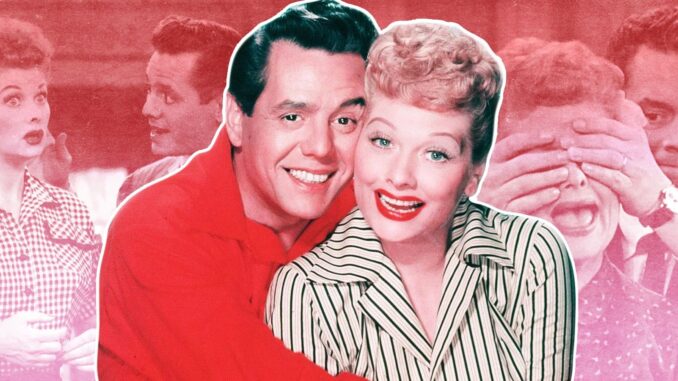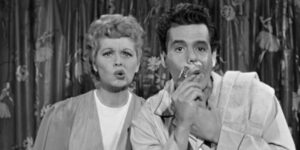
Introduction: A Casting Controversy That Changed Television Forever
When you think of classic TV, I Love Lucy instantly comes to mind. But did you know the show almost didn’t happen because of one controversial casting choice? At the heart of this iconic series was a decision that redefined what was possible on television. Let’s dive into how Lucille Ball and Desi Arnaz forever changed the entertainment industry.
The Risky Casting Choice That Sparked Controversy
Why Lucille Ball Wasn’t Enough for CBS
Lucille Ball was already a star, but CBS wasn’t convinced she could carry a TV show. The network wanted a familiar, relatable lead actress. But when Lucille insisted her real-life husband, Desi Arnaz, play her on-screen spouse, executives were hesitant. Why? Because Arnaz was Cuban-American, and interracial couples were rarely, if ever, seen on TV.
Breaking Barriers in an Era of Conformity
In the 1950s, the entertainment world was deeply conservative. Casting Arnaz as Ricky Ricardo, a character who mirrored his real-life background, was a bold move. It wasn’t just about talent; it was about defying societal norms.
Lucille Ball Fights for Desi Arnaz
A Marriage That Transcended Stereotypes
Lucille and Desi’s real-life chemistry was undeniable. However, convincing CBS was no easy task. They had to prove that audiences would embrace their dynamic, both as a couple and as individual characters.
The Live Performance That Sealed the Deal
Determined to showcase their on-screen magic, Lucille and Desi took their act on the road. The live performances were a hit, and CBS executives finally saw the potential. Sometimes, you’ve got to bet on yourself, and that’s exactly what they did.

The Birth of the Modern Sitcom
How ‘I Love Lucy’ Revolutionized Storytelling
Beyond its casting, I Love Lucy changed the game in how sitcoms were produced. The show introduced the concept of a live studio audience, bringing a theater-like experience to living rooms across America.
The Multi-Camera Technique That Set a New Standard
Desi Arnaz, drawing from his experience in live performance, championed the use of multiple cameras. This technique, still a standard in sitcoms today, allowed for seamless editing and genuine audience reactions.
Cultural Impact: A Couple Who Changed Hearts and Minds
From Controversial to Beloved
Initially, some viewers were wary of an interracial couple on TV. But the relatable humor and undeniable chemistry of Lucy and Ricky won them over. The show didn’t just entertain—it subtly challenged prejudices.
The Ricardo Family: A Reflection of Changing Times
As I Love Lucy progressed, it tackled themes like parenthood and family dynamics, reflecting the evolving American household. The show humanized the Ricardos, making them feel like next-door neighbors.
How ‘I Love Lucy’ Influenced Future TV Shows
Opening Doors for Diverse Casting
The success of I Love Lucy paved the way for greater representation on television. Shows like The Jeffersons and Modern Family owe a debt to the groundbreaking work of Lucille Ball and Desi Arnaz.
A Legacy of Risk-Taking
Networks learned an important lesson: audiences appreciate authenticity. By taking risks, I Love Lucy proved that unconventional casting could lead to mainstream success.

Behind-the-Scenes Drama and Triumphs
Navigating the Challenges of Fame
While I Love Lucy thrived on-screen, the pressures of fame tested Lucille and Desi’s marriage. Balancing work and personal life was no small feat, yet their professionalism never wavered.
The Power Couple Who Built an Empire
Together, Lucille and Desi founded Desilu Productions, a powerhouse studio responsible for hits like Star Trek and Mission: Impossible. Their influence extended far beyond I Love Lucy.
Lessons from ‘I Love Lucy’ for Today’s Creators
Embrace Diversity and Innovation
The entertainment industry continues to evolve, but the lessons from I Love Lucy remain relevant. Success often lies in bold, unconventional choices.
The Importance of Authentic Representation
Audiences connect with stories that feel real. Just like Lucy and Ricky, today’s characters resonate when they reflect the complexities of real life.
Conclusion: The Enduring Legacy of a Groundbreaking Show
I Love Lucy didn’t just make people laugh—it changed television forever. By challenging norms and embracing authenticity, Lucille Ball and Desi Arnaz set a precedent that continues to inspire creators today. Their legacy is a testament to the power of taking risks and staying true to your vision.
FAQs
1. Why was Desi Arnaz’s casting controversial?
Desi Arnaz’s casting was controversial because he was a Cuban-American actor in an era when interracial couples were rarely shown on TV.
2. How did ‘I Love Lucy’ change television production?
The show introduced the multi-camera technique and live studio audience format, revolutionizing sitcom production.
3. What impact did ‘I Love Lucy’ have on future TV shows?
It paved the way for diverse casting and showed that unconventional storytelling could resonate with audiences.
4. Did Lucille Ball and Desi Arnaz’s real-life marriage influence the show?
Yes, their real-life relationship added authenticity to their on-screen chemistry, making the show more relatable.
5. What is Desilu Productions, and why is it significant?
Founded by Lucille and Desi, Desilu Productions was behind iconic shows like Star Trek, influencing the TV industry for decades.